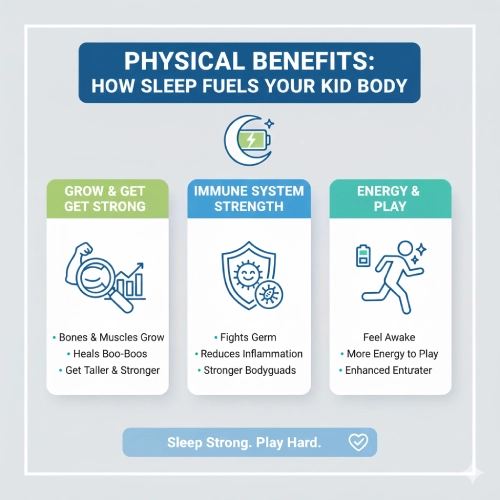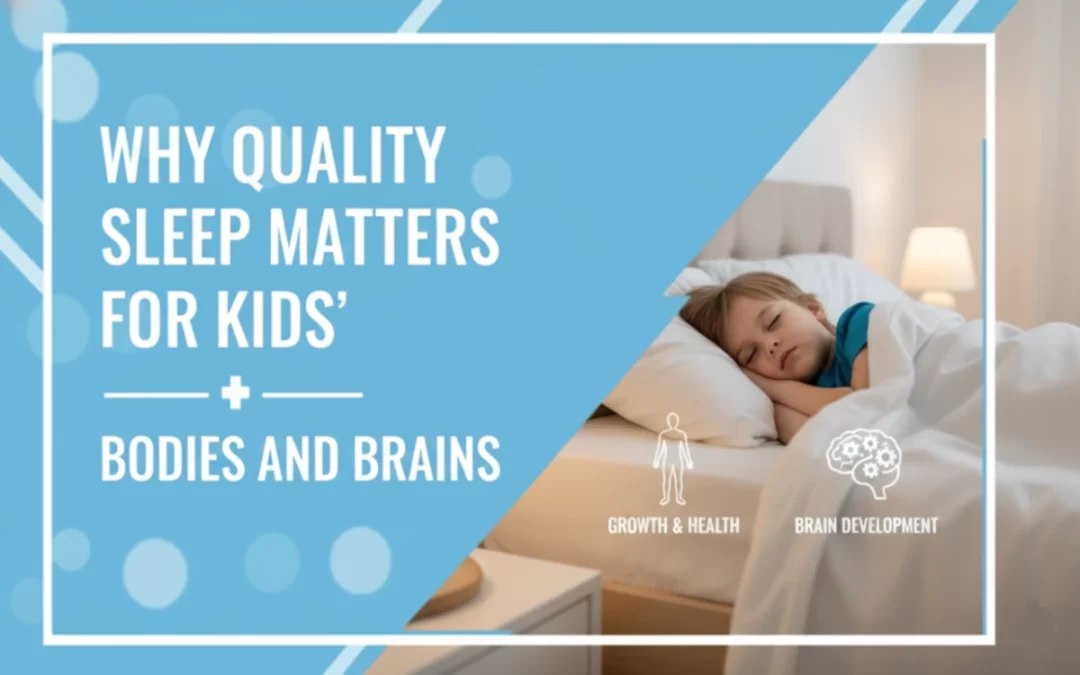Most parents understand that sleep is important, but not all realise just how essential quality sleep is for a child’s physical growth, mental development, and emotional regulation. Sleep is not merely “rest” — it’s a time when the brain processes what it learned, the body repairs and grows, and important hormones are released.
In children, whose bodies and brains are still developing, quality sleep is especially crucial. Skimping on sleep doesn’t just make kids cranky — it can interfere with how well they grow, learn, and manage their emotions. In this article, we’ll dive deep into the science-backed reasons why sleep matters for kids’ health and what you can do to make sure your child gets the rest they truly need.
What Is Quality Sleep in Children?
It’s easy to assume that if a child is in bed for 10 hours, they’re getting enough sleep. But there’s a difference between sleep quantity and sleep quality.
Quality sleep involves:
- Falling asleep within 15–30 minutes of going to bed
- Staying asleep through the night with minimal disturbances
- Experiencing enough deep (NREM) and REM sleep — essential stages for brain and body repair
- Waking up feeling refreshed and ready for the day
- Having consistent sleep routines with a stable sleep-wake cycle
Poor sleep quality — even if the number of hours is “technically” enough — can leave a child tired, irritable, and cognitively underperforming.
How Much Sleep Do Kids Really Need?
Children need more sleep than adults because they’re growing rapidly — physically, emotionally, and neurologically. According to the American Academy of Sleep Medicine, here are the recommended amounts of sleep per 24-hour period:
- Infants (4–12 months): 12–16 hours (including naps)
- Toddlers (1–2 years): 11–14 hours
- Preschoolers (3–5 years): 10–13 hours
- Children (6–12 years): 9–12 hours
- Teenagers (13–18 years): 8–10 hours
Falling short of these targets, even by an hour each night, can compound over time and affect attention span, learning, and mood.
Why Sleep Is Critical for Brain Development
1. Supports Memory and Learning
During sleep, the brain goes through a vital process called memory consolidation, where it organises, sorts, and stores everything learned during the day.
- REM sleep (the dream phase) is linked to emotional learning and creativity.
- Deep sleep strengthens brain connections and helps with problem-solving.
Children who consistently get high-quality sleep tend to retain information better, grasp new concepts quickly, and perform better academically.
2. Boosts Focus and Attention
Poor sleep can affect the prefrontal cortex, the part of the brain responsible for attention, decision-making, and impulse control.
In fact, some studies suggest that children who appear hyperactive or inattentive — symptoms often linked to ADHD — may actually be suffering from chronic sleep deprivation. Improving sleep can lead to noticeable improvements in classroom behaviour and focus.
3. Helps Regulate Emotions
Sleep helps the brain manage emotional responses. Without enough rest, children may:
- Be more irritable or moody
- Struggle to cope with stress or frustration
- Have trouble navigating social situations
Quality sleep promotes emotional resilience and allows children to develop stronger coping skills.
Physical Benefits: How Sleep Fuels the Body
1. Growth and Development

Growth hormone — the hormone responsible for building bones and tissues — is mostly secreted during deep sleep. That’s why babies and toddlers, who are growing rapidly, need so much sleep.
If a child doesn’t get enough restorative sleep, their growth may be slowed, and they may experience muscle fatigue, lower energy levels, or even delayed puberty in some cases.
2. Stronger Immunity
When we sleep, the body boosts its immune function by producing infection-fighting proteins called cytokines. These help fight off bacteria, viruses, and inflammation.
Children who consistently sleep well:
- Get fewer colds and infections
- Recover more quickly when they do get sick
- Respond better to vaccinations
Sleep-deprived children, on the other hand, may experience frequent illnesses and longer recovery times.
3. Healthy Weight and Metabolism
Lack of sleep disrupts hormones that control appetite — ghrelin (which makes you feel hungry) and leptin (which tells you when you’re full).
When children are sleep-deprived, they:
- Crave sugary or high-fat foods
- Tend to overeat
- Become less physically active due to fatigue
This increases the risk of childhood obesity, which brings its own set of long-term health risks like diabetes and high blood pressure.
Signs Your Child Might Be Sleep-Deprived
Sleep deprivation in children doesn’t always show up as tiredness — it can manifest as behavioural or emotional issues. Look out for signs like:
- Trouble waking up in the morning
- Falling asleep in class or during car rides
- Frequent mood swings or tantrums
- Difficulty focusing or remembering things
- Hyperactivity or impulsiveness
- Complaints of headaches or stomach aches
Recognising these signs early can help you make necessary changes before sleep issues turn into chronic problems.
Common Sleep Disruptors in Kids
1. Excessive Screen Time
Using screens before bed can interfere with melatonin, the sleep hormone. The blue light from phones, tablets, and TVs tricks the brain into thinking it’s still daytime.
Tip: Turn off screens at least 60 minutes before bedtime to help the brain wind down naturally.
2. Irregular Routines
Children thrive on structure. Without a consistent sleep and wake time, their internal body clocks (circadian rhythms) get thrown off, making it harder to fall asleep and wake up refreshed.
Tip: Stick to a regular schedule even on weekends.
3. Diet and Stimulants
Foods high in sugar or caffeine (like chocolate or cola) can over-stimulate the nervous system and delay sleep.
Tip: Avoid sugary snacks and caffeine-containing foods after the early evening.
4. Sleep Disorders
Sleep apnea, night terrors, restless legs syndrome, or insomnia can all affect how well your child sleeps — often without being obvious.
Tip: If your child snores loudly, breathes irregularly, or is constantly tired despite long sleep hours, consult a paediatrician or sleep specialist.
Tips to Improve Sleep Quality in Kids
Creating a healthy sleep routine doesn’t have to be complicated. Here are simple, effective steps:
Create a Relaxing Bedtime Routine
A consistent wind-down routine signals the brain it’s time to sleep. Try:
- A warm bath
- Reading a book
- Listening to calming music
Keep the Sleep Environment Sleep-Friendly
Make sure the bedroom is:
- Dark (use blackout curtains)
- Quiet or with gentle white noise
- Cool and comfortable
Remove Distractions
Avoid keeping TVs, tablets, or phones in the child’s bedroom. These can tempt children to stay awake even when they’re tired.
Encourage Daytime Activity
Physical activity during the day can help kids fall asleep faster and stay asleep longer. Just avoid high-energy play close to bedtime.
Talk About the Importance of Sleep
Frame sleep as something positive. Instead of saying “You have to sleep,” say “Your body and brain grow while you sleep!”
Sleep and Academic Success
Sleep plays a direct role in how well children learn and perform in school. With better sleep, children are more likely to:
- Stay focused in class
- Solve problems more creatively
- Remember what they learned
- Manage peer relationships with more emotional control
On the flip side, tired kids may be mislabelled as inattentive or disruptive when in fact they’re simply sleep-deprived.
When to Seek Professional Help
If you’ve tried creating a routine, cutting screens, and promoting healthy sleep habits but your child still struggles, it might be time to speak with a professional.
See your doctor if:
- Your child snores or gasps for air during sleep
- Sleep problems persist for more than 2–3 weeks
- There are behavioural or academic concerns linked to poor sleep
- Your child wakes up more tired than when they went to bed
A sleep evaluation or referral to a paediatric sleep specialist might be recommended.
Conclusion: Prioritising Sleep is Prioritising Health
Sleep is a silent partner in your child’s development. From helping the brain learn and grow to strengthening the body’s immune system, quality sleep touches nearly every aspect of kids’ health.
In a world full of distractions and busy schedules, sleep often gets pushed aside — but for children, it should be treated as a non-negotiable. Building healthy sleep habits today can lead to a lifetime of better learning, better health, and better emotional balance.

